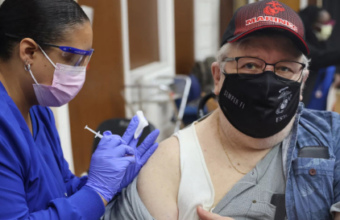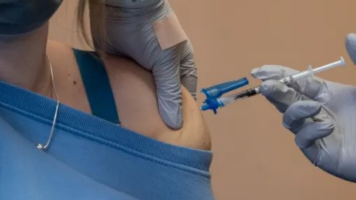COVID-19 News
COVID-19 Update | March 31, 2023
March 31, 2023

COVID-19 Update | March 31, 2023
The California Biotechnology Foundation is committed to keeping you up to date about COVID-19 testing, treatment and prevention advancements. The following resources track what progress has been made as of March 31, 2023. Notable advancements include:
- The U.S. Food and Drug Administration (FDA) may soon announce authorization of a second bivalent COVID-19 booster for individuals at high risk or are 65 and older.
- Lucira’s at-home combination of a COVID-19 and flu test has launched in the United States following a February authorization for emergency use from the FDA.
- The Pfizer/BioNTech mRNA COVID-19 vaccine is much better than natural infection at revving up key immune cells to fight future infection according to recent studies.
Recent News
- COVID-19 or Flu? New Nano-Sensor Delivers Answers in Just 10 Seconds
SciTechDaily – March 30, 2023
Scientists have developed a device using single-atom-thick nanomaterials capable of simultaneously detecting the presence of viruses causing COVID-19 and the flu. The device offers much lower detection levels and faster results compared to conventional tests. The researchers will present their findings at the ACS Spring 2023 hybrid meeting. - Considerations for implementing and adjusting public health and social measures in the context of COVID-19
World Health Organization – March 30, 2023
Public health and social measures have been implemented across the world to reduce SARS-CoV-2 transmission, morbidity, and mortality from COVID-19 and to prevent the overburdening of the health systems and other critical social functions. Since the last update of this interim guidance, several significant developments have occurred, including increased global population-level immunity against SARS-CoV-2. As the pandemic continues to evolve, PHSM should be regularly reviewed and adjusted based on ongoing situational assessments at the most local administrative level possible. - The FDA may soon authorize a spring round of COVID-19 boosters for some people
NPR – March 29, 2023
The agency is planning for an annual COVID-19 booster campaign starting in the fall — with vaccines that will have been updated to target whichever variant is expected to be circulating next winter. But some people who are particularly vulnerable to COVID-19 don’t want to wait. The FDA is reconsidering the situation and may authorize a second booster with the bivalent vaccines for at least some people, such as those who are at high risk because they have compromised immune systems or are 65 and older, a federal official who was not authorized to speak publicly told NPR. A decision could be announced within weeks. That approach is similar to what the Britain and Canada have done, and what some vaccine specialists have been urging — especially with the ample of supply of vaccine available. - Healthy kids, adolescents may not need COVID-19 shots, WHO says
The Seattle Times – March 29, 2023
Healthy children and adolescents may no longer need COVID-19 shots, the World Health Organization said, updating its guidance on vaccines as the world adjusts to living permanently with the virus. Older people and higher-risk groups — including those with underlying conditions — should get COVID-19 boosters between six and 12 months after their last injections, the WHO said in a statement announcing a revised vaccine road map for the new stage of the pandemic. - mRNA vaccine beats infection for key defense against COVID-19, Stanford Medicine scientists find
Stanford Medicine News Center – March 28, 2023
The Pfizer/BioNTech mRNA vaccine directed at COVID-19 is much better than natural infection at revving up key immune cells called killer T cells to fight future infection by SARS-CoV-2, the virus that causes COVID-19, Stanford Medicine investigators have found. The scientists also showed, in a study published online in Immunity, that getting infected by SARS-CoV-2 before getting vaccinated lowers the vaccine’s otherwise exceptional ability to spur proliferation and activation of killer T cells directed at SARS-CoV-2. Their finding suggests that those hoping to avoid the manifold health risks associated with COVID-19 would do well to get vaccinated before they contract the disease. - WHO revises COVID-19 vaccine recommendations for Omicron-era
Reuters – March 28, 2023
The World Health Organization has tailored its COVID-19 vaccination recommendations for a new phase of the pandemic, suggesting that healthy children and adolescents may not necessarily need a vaccine but older, high-risk groups should get a booster between 6 to 12 months after their last vaccine. The U.N. agency said the aim was to focus efforts on vaccinating those facing the greatest threat of severe disease and death from COVID-19, considering the high-level population immunity worldwide due to widespread infection and vaccination. The health agency defined high-risk populations as older adults, as well as younger people with other significant risk factors. For this group, the agency recommends an additional shot of the vaccine either 6 or 12 months after the latest dose, based on factors such as age and immunocompromising conditions. - Lucira announces US launch of combo COVID-19-flu home test
University of Minnesota Center for Infectious Disease Research and Policy – March 28, 2023
Lucira announced the US launch of its at-home combination COVID-19 and flu test, the first of its kind, following the February emergency use authorization (EUA) from the Food and Drug Administration (FDA). The biotechnology company, based in Emeryville, California, also announced that the test is now cleared for use as a point-of-care test in Australia. In earlier clinical trials, the molecular test has performed similarly for both COVID-19 and flu when assessed against polymerase chain reaction (PCR) tests. Lucira’s combo test also marks the availability of the first over-the-counter test for flu. - Nirmatrelvir tied to 26% lower risk of long COVID-19, 47% lower risk of death
University of Minnesota Center for Infectious Disease Research and Policy – March 23, 2023
The antiviral drug nirmatrelvir (one of the components of Paxlovid) lowered the risk of long COVID-19 in patients who had at least one risk factor for severe illness, finds a study published today in JAMA Internal Medicine. Researchers from the VA St. Louis Health Care System and Washington University used the US Department of Veterans Affairs’ healthcare databases to identify patients who tested positive for COVID-19 from January 3 to December 31, 2022, weren’t hospitalized on the day of the test, and had at least one risk factor for severe infection.
Rely on California Biotechnology Foundation to monitor breaking news and provide updates on the latest advancements in COVID-19 diagnostics, vaccines and treatments.
Stay informed on the latest news and trends on the economic and health benefits of this industry by visiting the new CABiotech.org
If you have any questions about hosting informational briefings for your colleagues serving in the legislature, contact California Biotechnology Foundation Executive Director Patty Cooper at (916)764-2434 or [email protected].


